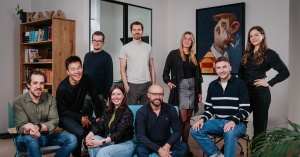Aristos Doxiadis is an economist and sociologist who is also a pioneer of private equity in Greece. In his 28 years as investment manager, he has invested in technology startups (with Openfund), and in growth companies across a wide range of industries, from table grapes and health clubs to book logistics and banking software (with Commercial Capital and Eikon Capital). He has participated on the boards of dozens of companies and taken an active executive role in some of those. Currently, he is a partner at the Greek deep tech fund Big Pi Ventures which has a wide number of AI-first companies in its portfolio such as Altered, OrthoSon, Intelligencia, Tile DB, etc..
Aristos is also a well-known analyst of the Greek economy and society and has extensive experience in management consulting and public policy advice. He holds a BA in Social Studies (Harvard), and an MSc in Economics (Birkbeck College, London). He also serves as a vice president of the National Council for Research, Technology, and Innovation (NCRTI).
In this interview, Aristos Doxiadis discusses the evolution of the investment climate in Greece, noting a rise in venture capital funds and an increase in tech startups, especially in deep tech. Greece, while slightly behind countries like Portugal and Ireland, is growing rapidly in this domain. Factors attracting multinationals and investors include the abundance of educated STEM graduates, a strong diaspora returning to Greece, and a cost-effective talent pool. However, challenges persist, such as the lack of regional early adopters in the corporate sector and the need for startups to seek funding beyond the seed and Series A stages.
The following interview was conducted as a part of The Recursive’s “State of AI in CEE” report. Download the full report with insights from 40+ experts and an analysis of 900 AI product companies from CEE here.
The Recursive: How do you see the investment climate evolving over the past few years in Greece? What key trends are you observing when it comes to AI in particular?
Aristos Doxiadis: The number of venture capital funds has increased very much in the last 10 years. We only had two early-stage tech funds in 2012. We now have at least seven. I’m not counting the growth equity funds. We have around 800 technology startups with innovative and scalable products.
If you compare Greece with Portugal or Ireland, countries with similar populations, we’re a bit behind in terms of numbers, but we’re growing fast.
At Big Pi, we’re looking at deep-tech startups that have corporate or business customers. Many of them started out without using AI but they were using expert systems, algorithms, and automation. As time went by many of them have become sophisticated users of AI. Some of them are producing their own algorithm. I think that funding for the early stages is progressing pretty well.
Some large multinationals have made substantial investments in Greece’s R&D teams, specifically in data analytics and AI. Pfizer, for example, has a pretty large base in Thessaloniki. EY started a collaboration with one of our big research centers Demokritos in 2019. They work mainly on AI related to text recognition.
We have a few other multinational consultancies like Accenture, for example, that have AI people in Greece. This is a recent phenomenon, in the last five years.
What are the factors that contribute to the multinationals’ and investors’ interest?
The fact that we have a lot of educated people, graduates from STEM schools. We also have a tradition of the past 20 years of world-class academics working on data analytics and signal processing who have evolved into working on AI. We have a good cluster of academics in those fields that will produce good students. These graduates do not have employers in manufacturing or industry and we also don’t have funding for technical universities with heavy laboratories or lots of equipment.
So, these graduates focus on areas like mathematics and data analytics. If an investor comes to Greece, they find a lot of entry-level talent and recent graduates who are willing to work for them. I think this is a positive peculiarity of Greece.
We also have a very strong diaspora. People who grew up in Greece, then went abroad to study or work, and many recently came back to Greece.
It is an interesting combination. Recent graduates from a technical university in Greece and senior people with 10+ years of experience in industry in Switzerland or Sweden who come back and train the junior guys. This works really well and it’s a constant pattern in the startups we invest in.
We have also invested in dual geography startups where the founders are based in metropolitan global centers like New York, London, or Zurich, and decide to set up their R&D or product development team in Greece.
Usually, marketing and business development are in the global metropolitan areas, and the back office and the R&D are in Greece. This dual geography seems to work extremely well because salaries in Greece are lower and employees tend to be more loyal. They don’t change employers every 12 months.
We have seen the same pattern in other countries in the region. But in this process, can we develop the marketing and sales expertise that is lacking in the CEE?
I have not seen it happening because usually deep tech startups that use heavy AI, cannot sell easily from afar. You cannot do sales from your office in Athens. You need to be able to visit the customers because your initial customers tend to be large corporates.
If you’re working with small and medium enterprises globally, and selling them a SaaS product, you can do your marketing from inside the office in Greece.
But with AI tools, you have a long sales cycle, and you need to approach the customer again, and again. Therefore, you need to have people established where the largest customers are and where the early adopters are.
One of the problems we have in Greece and maybe in most of Central and Eastern Europe is that we do not have early adopters on the corporate level. Because we don’t have many globally competitive corporations whose headquarters are based in our region.
What other challenges do AI startups in Greece face?
At the moment, there is enough funding for the seed stage and Series A. But if you go beyond that for Series B, etc. we don’t have funds in the region. Startups need to go out. This is a challenge. If they have good traction though, and they’ve been able to build a substantial company with Series A funding, then it should not really be a problem, but they need to go out.
The other challenge I already mentioned – it is very hard for early-stage startups in Greece compared to those in the US or the UK to get logos on their website very early on saying that this major corporation has tested their product.
It’s especially hard if you’re in medical devices. Usually in health tech and med tech, a very important resource for sales is the so-called Key Opinion Leaders (KOL), who tend to be globally recognized specialist doctors. We don’t have that many globally recognized KOLs in our region.
When you were setting up Big Pi Ventures, why did you go after deep tech, even before AI was the hype that is now?
Deep Tech has a disadvantage in the sense that you don’t see huge growth curves very early on.
The advantage is that if you have very good scientists and engineers who have been working on a problem for several years, they build a technological advantage that is not easy to copy. And it doesn’t really matter if you haven’t grown very fast to begin with. Once you get to market you have an advantage.
We saw that successful deep tech startups can be more dispersed geographically than successful B2C startups.
The other thing was that most of the early-stage funds in Greece have derived much of their capital from public sector money, like the European Regional Development Fund. Some of that capital was specifically allocated to deep tech. When Big Pi was set up, in order to get our funding, we had to commit that we would devote most of our energy to deep tech.
And I think this was a very good choice. It’s still early to see how many times our Big Pi Fund is going to be returned to investors. But on a personal level, the level of interesting stuff that I see every week is amazing. It keeps me young. If I were seeing marketplaces all the time, perhaps I would have been bored.
How do you evaluate the potential of an AI startup?
We view AI as a technique, as a tool. We look at the value proposition of the product. What does it solve? How big is the market? Do they have a specific advantage that other people don’t have? What is the feedback from initial users? A standard venture capitalist mentality.
AI is in a sense, a secondary question. If we find out that the product is strong enough or that the team understands the technology, usually nowadays it also means that they have very strong AI introduced. It’s not the other way around. It’s not that AI builds something that in itself is a competitive product.
This is probably a characteristic of small ecosystems like ours. I don’t think you can do something like Deep Mind from a country like Greece. Deep Mind was developing tools that had a huge number of potential applications but were not working specifically on one potential application. They became famous for solving puzzles and games like Go but they had such a strong technical background that eventually this evolved into something that has real value like protein folding.
What we can see in small ecosystems is domain experts who understand the needs of a particular industry, who then go back and use AI tools to provide excellent new tools for that particular industry.
For example, the customers of Intelligencia, a bioinformatics startup that we have invested in, are pharma and biotech companies that develop new drugs. Intelligencia tried to help them understand the risks of investing heavily in clinical trials. What is the probability that after they have invested half a billion in clinical trials for a new drug, they will actually get FDA approval?
This is where Intelligencia started – trying to figure out how can they help these companies assess the risk. They started by using less AI and over the years they used more and more AI and now they have a great AI and data analytics team.
Which are the domains in the Greek tech ecosystem where you have seen the most AI solutions?
When it comes to specific verticals, what we have seen in the Greek startup ecosystem is a lot of image-based diagnostics. AI that interprets images not only in medical diagnostics but also in agriculture. You look at the field with images and see whether you need to use fertilizer or not. In the maintenance of wind turbines, for example, you send a little drone that recognizes through image processing, whether you need maintenance.
We have seen not very much generative AI. We have seen nothing with its own large language model. But we have invested in a company called Altered, in voice synthesis. They take my voice and turn it into the voice of Barack Obama in real time using generative AI.
And then we have bioinformatics. Besides Inteligencia there is Causaly.
We have seen recently customer support using AI to build natural-sounding bots.
What is Greece’s approach to supporting AI research and development?
For many years we had a very fragmented academic research environment. We have a big number of laboratories but with limited funding and people working on state salaries. They survive mostly on EU programmes, such as Horizon.
We have not had a prioritization of research by a central body with a dedicated budget to spend. At the policy advisory council where I am a member (The National Council for Research, Technology, and Innovation (NCRTI) – ed.note), we are trying to convince the government that they need to do that. From now on, there should be money allocated for basic research in specific areas.
That said, we have one recent AI-targeted development that has good funding – a new unit called Archimedes in the research center Athena. They have secured substantial funding that will enable them to have about 15 to 20 teams with long-term horizons, working on AI subjects. This is a first for Greece.
Can you elaborate on the role of the National Council for Research, Technology, and Innovation in Greece’s innovation landscape?
The Council has been around for 15 years but previously it was composed of people from the academic and research community. In 2019, the government decided to bring venture capitalists and technology entrepreneurs to the body. Now we’re a combined team, which works well because the researchers can understand what the industry needs, and we can understand what the challenges for the research community are. I think we have a good mix of ideas that we propose. We work pro bono, of course, so sometimes it’s hard to put in all the effort that is needed to follow up on our proposals.
There are several things that I was involved in that are, I believe, useful for the ecosystem. We had the government set up the platform registry for startups Elevate Greece. We helped in setting the criteria for what a tech startup is.
We completely overhauled legislation on spin-offs and technology transfer out of universities and research centers and now, after the new law passed two years ago, we have seen an explosion in the number of spin-offs coming out of universities.
What we want to do in the next couple of years is set a policy of open datasets in Greece. We want to make a very strong case to the government that we need policy and funds to encourage large open data sharing. We also want to get the large public sector actors to become early adopters of Greek startups.
This is on our agenda.
How would you access the current availability and quality of AI Talent in Greece?
On the level of product development within the company, the availability is great. On the junior level, the availability is very good. On the senior level, we are filling in the gaps by attracting diaspora Greeks.
But what is missing and what is difficult to find is people who are customer-facing and understand how to assess the customer’s needs or how to do technical sales for the customer. Product managers in the sense of what features should the product have to become immediately attractive to customers. What modification should we make after we talk to customers? These are skills that you don’t acquire just by talking to your team but by talking to a lot of people out there. We don’t have that much talent there. We need to import it or use the dual geography that I talked about earlier.
I think in general in CEE we have better availability of talent but where we should be improving is collaboration between academia and the industry and access to funding. We need a smart type of funding, a mix of government grants and risk capital combined to bring products to market.








